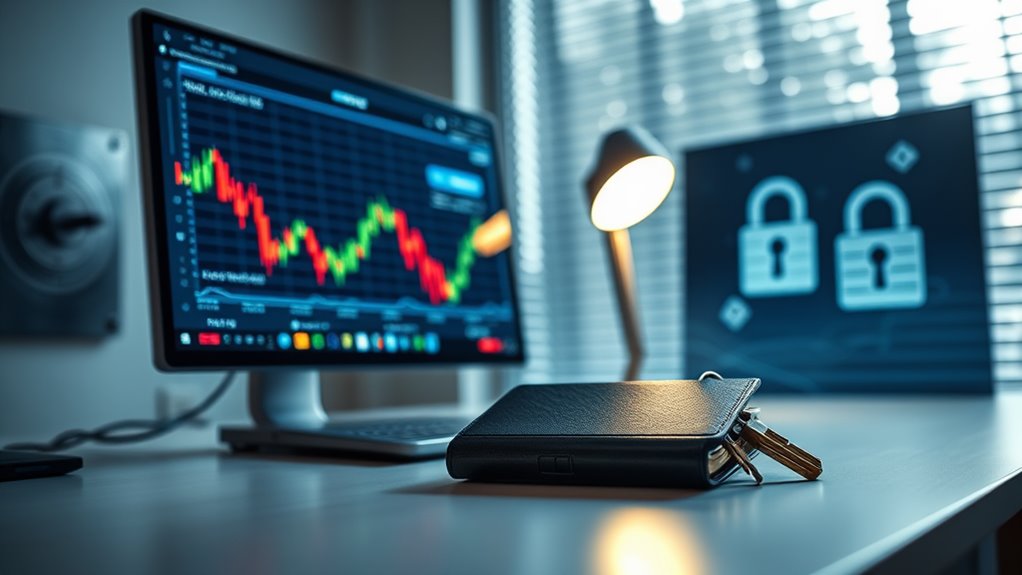
Beginner’s Guide to Buying Crypto: Essential Steps and Benefits Revealed
To start buying cryptocurrency, first select a reputable exchange with strong security measures and user-friendly features. Then, set up an account, complete the KYC process, and secure it with two-factor authentication. Choose cryptocurrencies based on their market stability and potential use cases. Invest using a strategy that includes diversification and regular portfolio reviews to minimize risks. Implementing key security practices is essential to protect investments. For more thorough insights, further exploration will equip beginners with essential knowledge.
Key Takeaways
- Choose a reputable cryptocurrency exchange with strong security measures and compliance with regulatory standards.
- Set up your exchange account, enable two-factor authentication, and secure your account with a strong password.
- Research and select your first cryptocurrency based on market stability, use cases, and liquidity.
- Initiate your first transaction using a limit order to control the buying price and minimize risks.
- Diversify your investments and develop an effective strategy to manage risks and maximize potential returns.
Selecting the Right Cryptocurrency Exchange

When selecting the right cryptocurrency exchange, it is essential to evaluate various important factors to guarantee both security and efficiency in trading activities.
Key elements include robust security measures like two-factor authentication, cold storage, and whitelisting of withdrawal addresses to secure funds.
It's vital to choose platforms with a solid reputation and positive user reviews indicating trustworthiness. Compliance with regulatory standards, including KYC and AML policies, assures lawful operation.
Additionally, an intuitive, user-friendly interface and responsive customer support, ideally available 24/7, are important for smooth trading experiences.
Understanding order types like limit orders and market orders can significantly enhance your trading decisions.
These criteria help minimize risks and improve the overall effectiveness of cryptocurrency trading for both novice and experienced users.
Choosing Your First Cryptocurrency

When selecting a first cryptocurrency, potential investors must assess market stability, examining factors like market capitalization and historical volatility. Evaluating the use cases of each cryptocurrency is also essential, as it determines the practical applications and potential demand for the currency. These steps are foundational in making informed decisions about which cryptocurrency might best align with one's investment goals and risk profile. Additionally, exploring the variety of altcoins as alternatives to Bitcoin can provide broader investment opportunities and insights into the evolving cryptocurrency landscape.
Assessing Market Stability
Why is it essential to evaluate market stability before choosing your first cryptocurrency? Cryptocurrencies exhibit extreme volatility, marked by swift price shifts which can challenge even seasoned investors. Events like the TerraUSD crash underscore stablecoins' vulnerabilities, influencing overall market stability.
Understanding this volatility aids in traversing the risks and opportunities inherent in crypto investments.
Additionally, market sentiment considerably impacts price dynamics, fluctuating with news and public perception. Tools that monitor sentiment can guide investment timing, as emotional market responses often dictate short-term price movements.
Lastly, evaluating liquidity and trade volume is vital. Cryptos with higher liquidity typically sustain less volatile environments, offering a more stable entry point for newcomers.
Regulatory shifts also bear watching, as they can swiftly alter market stability.
A new sentence with trading volume and liquidity allows traders to better predict and capitalize on potential price movements by understanding how actively a cryptocurrency is being traded and how easily it can be bought or sold.
Evaluating Use Cases
Understanding market stability provides a foundation for observing how cryptocurrencies function under various economic conditions.
When choosing your first cryptocurrency, evaluating practical use cases is vital. Cryptocurrencies facilitate faster and cheaper international remittances compared to traditional methods. In e-commerce, they offer secure, irreversible transactions ideal for online shopping.
The decentralized finance (DeFi) sector uses cryptocurrencies for lending, borrowing, and trading without intermediaries, enhancing financial inclusion. Cryptocurrencies are also instrumental in fundraising through Initial Coin Offerings (ICOs), providing transparency and global access.
Additionally, they support microtransactions, allowing digital content creators to receive small payments efficiently. Each use case presents unique opportunities and challenges, guiding investors in selecting a cryptocurrency that aligns with their personal or business needs. A key advantage of DeFi is its decentralized nature, which ensures that financial services are accessible worldwide, without the need for traditional banking infrastructures.
Establishing a Secure Crypto Wallet

When establishing a secure crypto wallet, it is imperative to select a reliable wallet provider known for strong security features and positive user reviews. The user must also implement backup and recovery procedures, such as recording seed phrases and employing strong, unique passwords, to safeguard access to their funds. These steps are essential in minimizing the risk of loss or theft in the volatile domain of cryptocurrency. Additionally, consider the use of multi-signature protection to further enhance the security of your digital assets.
Choosing a Reliable Wallet
Establishing a secure crypto wallet is essential for anyone looking to buy or trade cryptocurrencies. When selecting a wallet, the choice between custodial and non-custodial types hinges on user preference for security versus convenience.
Custodial wallets, often provided by exchanges, are easy to use but pose higher security risks as the control lies with a third party. Non-custodial wallets offer more security, as they allow users to maintain control over their keys.
When dealing with frequent transactions, online hot wallets like MetaMask or Trust Wallet provide ease but are vulnerable to cyber-attacks. Conversely, cold wallets such as the Trezor Model T or Ledger Nano X, although pricier, offer enhanced security by storing keys offline, ideal for long-term storage or larger amounts.
To further ensure asset security, some wallet options come integrated with advanced security protocols such as two-factor authentication or biometric scanning, which can discourage unauthorized access and provide an additional layer of protection.
Backup and Recovery Procedures
After choosing a reliable wallet, the next step is to guarantee that proper backup and recovery procedures are in place.
Initially, secure a seed phrase upon setting up your wallet, which is essential for future wallet recoveries. For utmost security, store private keys offline to prevent unauthorized access. Avoid using cloud storage for these keys due to hacking risks.
Implement regular backup updates to cope with device changes or theft. Should you need to restore your wallet, the seed phrase enables recovery on any compatible device.
Additionally, it is vital to implement two-factor authentication for an added layer of security on all transactions and wallet access, minimizing the risk of unauthorized entries.
How to Make Your First Cryptocurrency Purchase

Many individuals around the globe are taking the leap into the world of cryptocurrencies, an innovative financial sector marked by its use of blockchain technology.
To make your first purchase, select a reputed platform such as Coinbase, Binance, or Kraken, which caters to beginners with user-friendly interfaces and a variety of trading options.
Explore cryptocurrency trading on user-friendly platforms like Coinbase, Binance, or Kraken, perfect for beginners.
Next, create an account by providing personal information and completing identity verification (KYC). Secure your account with a strong password and enable two-factor authentication for added security.
Fund your account using a bank transfer, credit card, or PayPal, and decide whether a market or limit order suits your initial buy.
Starting small will help you learn the market dynamics without significant risk.
Additionally, evaluating the fee structures of these platforms can help you save on transaction costs and maximize your investment returns.
Developing Effective Crypto Investment Strategies

As the cryptocurrency market continues to evolve, developing effective investment strategies becomes essential for both new and experienced investors. Here are key strategies:
1. Diversification: Spread investments across various assets such as altcoins, stablecoins, and DeFi projects to minimize risks and enhance potential returns.
Constantly rebalance your portfolio to adapt to market changes.
2. Consistent Investing: Implement dollar-cost averaging by investing fixed amounts at regular intervals.
This reduces the impact of volatility and encourages financial discipline.
3. Informed Decisions: Stay updated on market trends, regulatory changes, and significant technological advancements.
Analyze whitepapers and team backgrounds for informed decisions.
4. Goal Setting: Define clear financial objectives and establish an exit strategy to optimize profitability and minimize losses through disciplined approaches.
Dollar-cost averaging offers a practical solution to navigate the unpredictable nature of the crypto market, which especially appeals to new investors.
Avoiding Common Beginner Mistakes in Crypto

Why do so many beginners stumble when entering the cryptocurrency market?
Often, beginners make informed decisions without adequate research, succumbing to FOMO, and buying during market peaks, which can lead to significant losses. Many also put their funds into a single cryptocurrency without diversifying, which increases risk exposure.
Another frequent error is taking action based on unverified advice from social media or making impulsive investments driven by market hype without solid analysis or understanding of the underlying technology.
In addition, they may trade emotionally, responding hastily to market fluctuations – buying in excitement or selling in panic, which disrupts their investment strategy.
To navigate successfully, new investors must emphasize educating themselves, fostering a disciplined approach to investment, and maintaining a diversified portfolio. To enhance their trading success, beginners should also implement risk management strategies such as setting stop-loss orders to protect against significant losses.
Understanding Key Security Practices in Cryptocurrency

Moving beyond the pitfalls faced by beginners in the cryptocurrency space, it is equally important to focus on safeguarding the digital assets that one has already acquired or is planning to acquire.
Here are key security practices essential for protection:
- Private Key Protection: Use hardware wallets and robust encryption to secure private keys.
- Wallet Security: Implement multi-factor authentication and strong passwords.
- Transaction Security: Always verify recipient wallet addresses to avoid misdirected funds.
- Network Security: Utilize firewalls and intrusion detection systems to protect against cyber-attacks.
Employing these security measures greatly enhances the safety of your cryptocurrency investments, helping to prevent potential losses due to hacks, errors, or unauthorized access.
Keeping up With Crypto Markets and Adjusting Your Strategy

Given the rapid changes sweeping through the cryptocurrency markets, investors need to stay informed and be willing to adjust their strategies accordingly.
As regulatory environments evolve and the integration of decentralized finance (DeFi) and artificial intelligence (AI) progresses, staying abreast of the latest developments is essential for maintaining market relevance.
The increasing usage of stablecoins for transactions and the growth in asset tokenization present new possibilities and risks.
Understanding and adapting to market volatility, regulatory changes, and technological advancements can greatly influence investment decisions.
Regularly updating investment strategies based on reliable information and diverse market analyses will help navigate these shifts, safeguard investments, and potentially harness opportunities for growth within the dynamic cryptocurrency landscape.
Frequently Asked Questions
What Are the Tax Implications of Cryptocurrency Investments?
Cryptocurrency is treated as property for tax purposes, with transactions triggering capital gains taxes. Reporting includes gains, losses, exchanges, and income from mining, requiring detailed record-keeping to guarantee compliance with tax regulations.
How Does Cryptocurrency Mining Work?
Cryptocurrency mining involves verifying transactions and incorporating them into the blockchain, using specialized hardware to solve cryptographic puzzles. Successful miners are rewarded with new cryptocurrency and transaction fees, enhancing network security.
Can Cryptocurrencies Become Worthless?
Cryptocurrencies, sailing the speculative seas, may hit an iceberg of worthlessness if investor trust falters. Lack of intrinsic value, volatility, and potential regulatory crackdowns could sink their value to nothing, leaving a financial wreckage.
What Environmental Impact Does Cryptocurrency Mining Have?
Cryptocurrency mining has significant environmental impacts, consuming vast amounts of energy, contributing to carbon emissions, and generating electronic waste. Health risks from air pollution and global calls for renewable energy usage are increasing concerns.
How Does Blockchain Technology Underpin Cryptocurrencies?
Blockchain technology underpins cryptocurrencies by providing a decentralized, secure platform through an immutable ledger that records transactions across multiple computers, ensuring transparency, privacy, and resistance to tampering via cryptographic and consensus-based validation mechanisms.
Conclusion
Maneuvering the cryptocurrency arena can be like crossing a digital minefield for beginners. However, by carefully selecting a reputable exchange, choosing a solid cryptocurrency, securing a dependable wallet, and making informed purchases, you lay a strong foundation for potentially lucrative investments. Continuously educating yourself on market trends and adopting prudent investment strategies will help you avoid common pitfalls and enhance your chances of success in the dynamic world of crypto. Always prioritize security to safeguard your digital assets.














